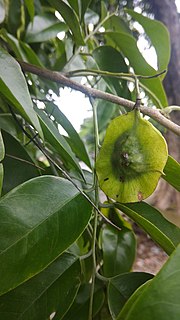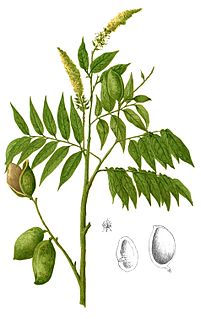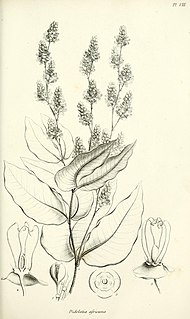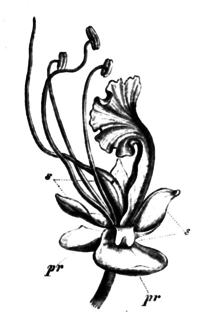
Pterocarpus is a pantropical genus of trees in the family Fabaceae. It belongs to the subfamily Faboideae, and was recently assigned to the informal monophyletic Pterocarpus clade within the Dalbergieae. Most species of Pterocarpus yield valuable timber traded as padauk ; other common names are mukwa or narra. P. santalinus also yields the most precious red sandalwood in China known as Zitan. The wood from the narra tree and the Burmese padauk tree is marketed as amboyna when it has grown in the burl form. The scientific name is Latinized Ancient Greek and means "wing fruit", referring to the unusual shape of the seed pods in this genus.

Guibourtia is a flowering plant genus in the family Fabaceae, also known by the common names as Rhodesian copalwood, African rosewood, amazique, bubinga, kevazingo and ovangkol.

Cynometra is genus of tropical forest trees with a pantropical distribution. It is particularly important as a forest component in west Africa and the neotropics. Cynometra alexandri (muhimbi) is a familiar timber tree of central and east Africa. The genus is a member of the subfamily Detarioideae. It has been suggested that Cynometra is polyphyletic and is in need of revision. In 2019, beside description of 4 new species, Aleksandar Radosavljevic suggested that the species formerly recognized as Maniltoa should be included in this genus and some of the mainland tropical African species excluded from this genus because of their jointed pedicels and dehiscent fruits.

The subfamily Detarioideae is one of the subdivisions of the plant family Fabaceae (legumes). This subfamily includes many tropical trees, some of which are used for timber or have ecological importance. The subfamily consists of 84 genera, most of which are native to Africa and Asia. Pride of Burma and tamarind are two of the most notable species in Detarioideae. It has the following clade-based definition:
The most inclusive crown clade containing Goniorrhachis marginataTaub. and Aphanocalyx cynometroidesOliv., but not Cercis canadensisL., Duparquetia orchidaceaBaill., or Bobgunnia fistuloides(Harms) J. H. Kirkbr. & Wiersema.

Crudia is a genus of plants in the family Fabaceae.

Didelotia is a genus of flowering plants in the family Fabaceae.
Englerodendron is a small genus of legumes belonging to the family Fabaceae, that are native to tropical Africa.

Julbernardia is a genus of plants in the family Fabaceae. There are eight species found in tropical Africa. They are medium-sized trees.
Loesenera is a genus of plants in the family Fabaceae.

Macrolobium is a legume genus in the subfamily Detarioideae. It is a tropical genus with about 80 species. Half occur in Brazil, where they are common in the floodplains of the Amazonian Basin. Members of the genus are used as ornamentals and for their wood.
Plagiosiphon is a genus of plants in the family Fabaceae.
Tessmannia is a genus of flowering plants in the family Fabaceae.
Tetraberlinia is a genus of plants in the family Fabaceae.
Zenkerella is a genus of plants in the family Fabaceae.

Aeschynomene is a genus of flowering plants in the family Fabaceae, and was recently assigned to the informal monophyletic Dalbergia clade of the Dalbergieae. They are known commonly as jointvetches. These legumes are most common in warm regions and many species are aquatic. The genus as currently circumscribed is paraphyletic and it has been suggested that the subgenus Ochopodium be elevated to a new genus within the Dalbergieae, though other changes will also be required to render the genus monophyletic.

Salacia is a genus of plants in the family Celastraceae. They are woody climbers naturally found in tropical regions.
Coelocaryon is a genus of flowering plants in the family Myristicaceae. It is native to tropical Africa.
Baphiastrum is a genus of flowering plants in the legume family, found in west Africa. It belongs to the subfamily Faboideae. Baphiastrum was traditionally assigned to the tribe Sophoreae; however, recent molecular phylogenetic analyses reassigned Baphiastrum to the Baphieae tribe.
Heckeldora is a genus of flowering plants belonging to the family Meliaceae. They are shrubs or small trees with odd-pinnate leaves. Plants are dioecious, with male and female flowers on separate plants.
Normandiodendron is a monotypic genus of flowering plants belonging to the family Fabaceae. It only contains one known species, Normandiodendron bequaertii(De Wild.) J.Léonard









